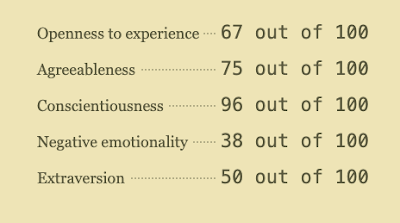A Defender in a Professional Learning Network
The Results
I'll admit that I was first shocked to see the results of my personality tests. For variation, I took the 16Personalities test first, My Personality Test's Personality Type Indicator a few days later, and FiveThirtyEight's quiz the following week. I remember taking similar personality type quizzes in high school and college, and the results were always the same: INFJ. Despite my expectations, I did not get these results this time around.
According to both 16Personalities and Personality Type Indicator, my MBTI (Myers-Briggs Type Indicator) personality is ISFJ-A.
 |
| Image courtesy of 16Personalities |
 |
| Image courtesy of Personality Type Indicator |
According to the two assessments, I am an introverted, observant, feeling, judging, and assertive person. The only shocker in those statistics is the "S" category. As I mentioned, I was always INFJ, so I was quite surprised to see an S instead of an N in both test results. As I investigated this mysterious "S" more, I learned that it means that I have a more observant personality compared to an intuitive personality. Once understanding the meaning of these two descriptors, I completely agree that I have shifted my outlook and approach to problems and solutions since college, and I think that my last four years in a school setting can be attributed to that change.
As 16Personalities explains, the main difference between mind intuitive (N) and observant (S) personalities is how they use the information they gather. Observant individuals prefer observable facts and straightforward outcomes, while intuitive individuals use their imaginative and creative abilities to envision the potential of their outcomes. After spending four years teaching within a district that is extremely rigid in its expectations of teachers and students and creation of programs and processes that must be fulfilled to their liking, I think that I adopted an observant outlook. As I plan to eventually leave the classroom, I wonder if I take these assessments again at that time if I will stay within the observant mindset, or if I will find myself as an INFJ once again.
The third and final assessment I completed was FiveThirtyEight's personality assessment. This quiz differed from the previous two, for instead of using the typical MBTI personality types, it gave me scores on five different important traits based how strongly I associated with each trait on a scale from 0 to 100. My results were as follows:
 |
| Images courtesy FiveThirtyEight |
 |
| Image property of author |


Great idea to break up your action plan into an achievable interval.
ReplyDelete